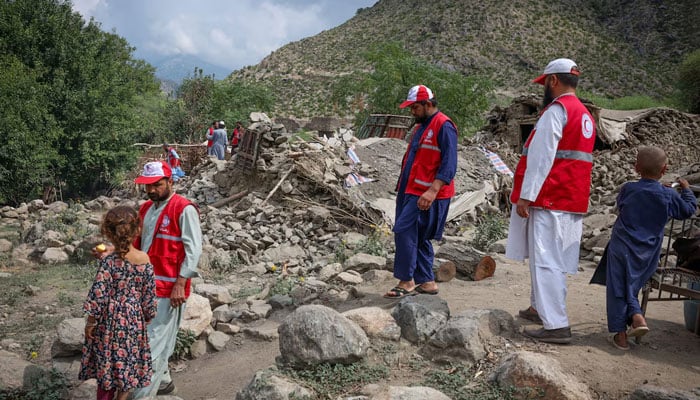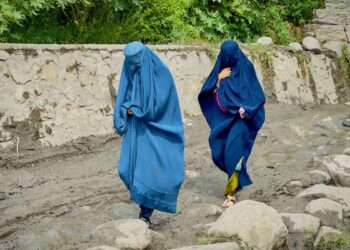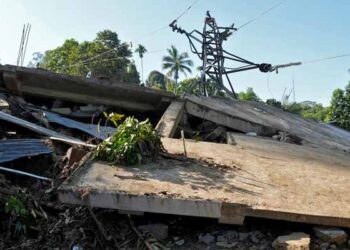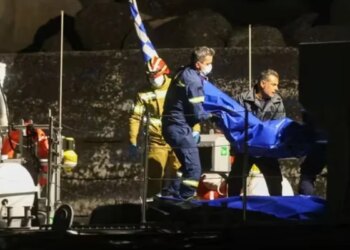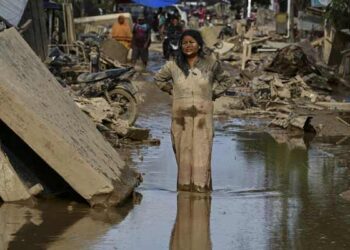Select Language:
Volunteers from the Red Crescent walk past damaged homes as they reach Lulam village to assist victims after a deadly magnitude-6 earthquake struck Afghanistan on Sunday, in Nurgal district, Kunar province, September 3, 2025. — Reuters
The death toll has reached 1,457, with 3,394 injured. The World Food Program (WFP) has issued a warning that food supplies will be exhausted within four weeks unless immediate funding is provided. Entire households have been wiped out.
Afghanistan deployed commandos via air on Wednesday to rescue survivors trapped under the debris in earthquake-affected regions, as the UN agency cautioned that food aid for victims is at risk of running out soon without urgent support. Dozens of special forces are being airlifted to remote locations inaccessible by helicopter to assist with rescuing the injured and moving them to safer areas, with aid groups emphasizing the urgency of saving those still buried under rubble.
The countdown is also pressing for those who survived the twin earthquakes in Afghanistan’s isolated eastern regions, according to the UN World Food Program (WFP) on Wednesday. John Aylieff, WFP’s chief in Afghanistan, indicated that the agency only has enough funding and supplies to last four more weeks. “Four weeks is simply not enough to meet the basic needs of the quake-affected population, let alone support their recovery,” Aylieff stated.
Funding for WFP in Afghanistan this year is just under $300 million, a significant drop from $1.7 billion in 2022, the country’s first full year under Taliban rule. The nation, with a population of 42 million living amid ongoing conflict, poverty, and dwindling international aid, has received limited global assistance following the disaster.
The initial magnitude-6 quake, one of the most destructive in recent years, caused extensive destruction when it hit Kunar and Nangarhar provinces around midnight on Sunday at a shallow depth of 10 kilometers. A second quake measuring 5.5 on Tuesday evening triggered panic, hampered rescue efforts, and caused landslides that blocked remote village roads.
According to the Taliban government, the earthquakes have resulted in 1,457 fatalities, 3,394 injuries, and destruction of more than 6,700 homes. The UN warns that these figures could rise as many people remain trapped under the wreckage.
Authorities have established a command post to coordinate aid and supplies, with two centers managing the transport of injured victims, burials, and rescue operations, said Ehsanullah Ehsan, disaster management chief in Kunar. “What we urgently need is air support—helicopters. Sadly, WFP had helicopters until a few months ago, but funding cuts stopped that,” Aylieff explained.
Afghanistan continues to suffer due to cuts in US foreign aid under President Donald Trump, combined with international frustration over Taliban restrictions on women and aid workers, leading to increased isolation.
Whole families have been obliterated in some villages, with survivors searching through debris for loved ones, carrying bodies on woven stretchers, and digging graves with makeshift tools. In Lulam village, one of the hardest-hit areas, 63-year-old Darbar, who goes by one name, said she and her family have been waiting for aid for three days since their home was destroyed. Sitting on a traditional wooden and rope bed, she described her injuries and expressed despair: “No one even hears our voices. Now we just sit in hope, with nothing to eat or a home to return to.”
On nearby mountain roads, trucks loaded with flour and men with shovels are heading toward even more severely impacted villages. Ruhila Mateen from Aseel, a humanitarian technology platform operating in the region, said conditions are deteriorating rapidly, especially for women and children. Fragile homes built from dry masonry, stone, and wood offer little protection from ongoing tremors, especially on ground made unstable by recent heavy rains, according to the UN Office for the Coordination of Humanitarian Affairs (OCHA).
The UN and aid organizations are calling for emergency shelter, food, sanitation, safe drinking water, and essential medical supplies. Doctors Without Borders (MSF) has distributed trauma kits at two hospitals in the affected areas and also appealed for increased humanitarian assistance.
Afghanistan, situated along the seismic-active Hindu Kush mountain range where tectonic plates converge, remains highly vulnerable to deadly earthquakes.

